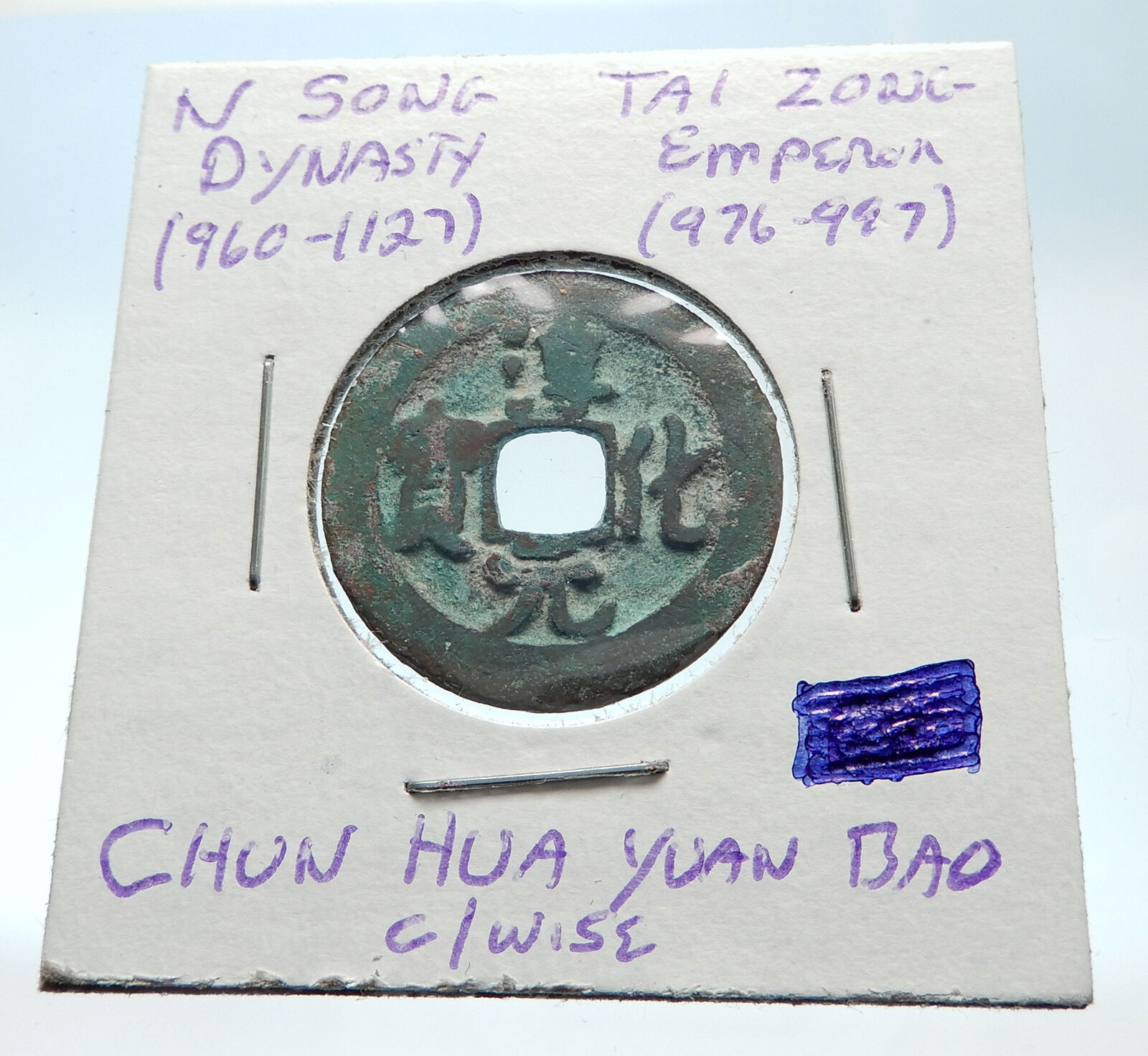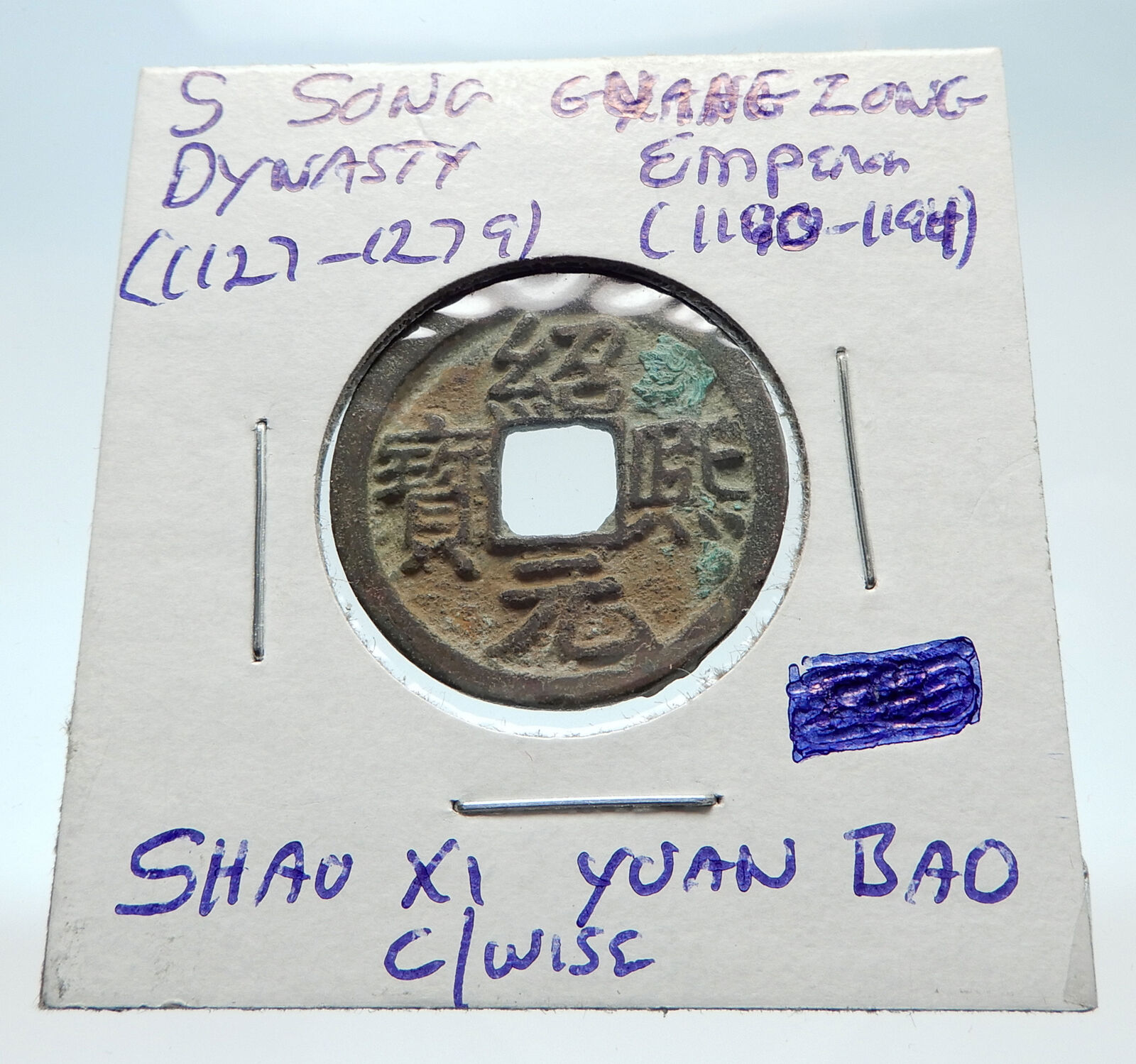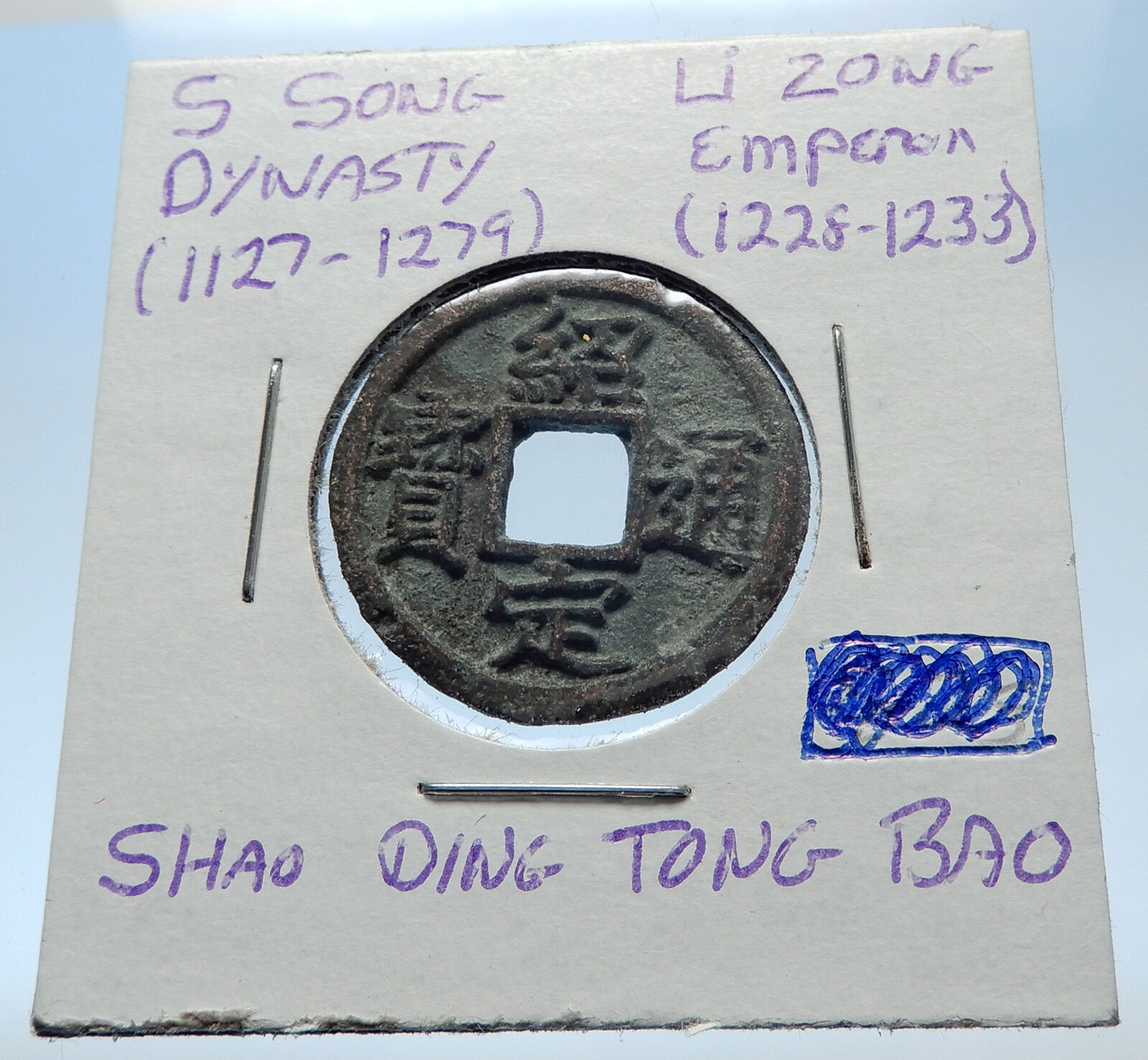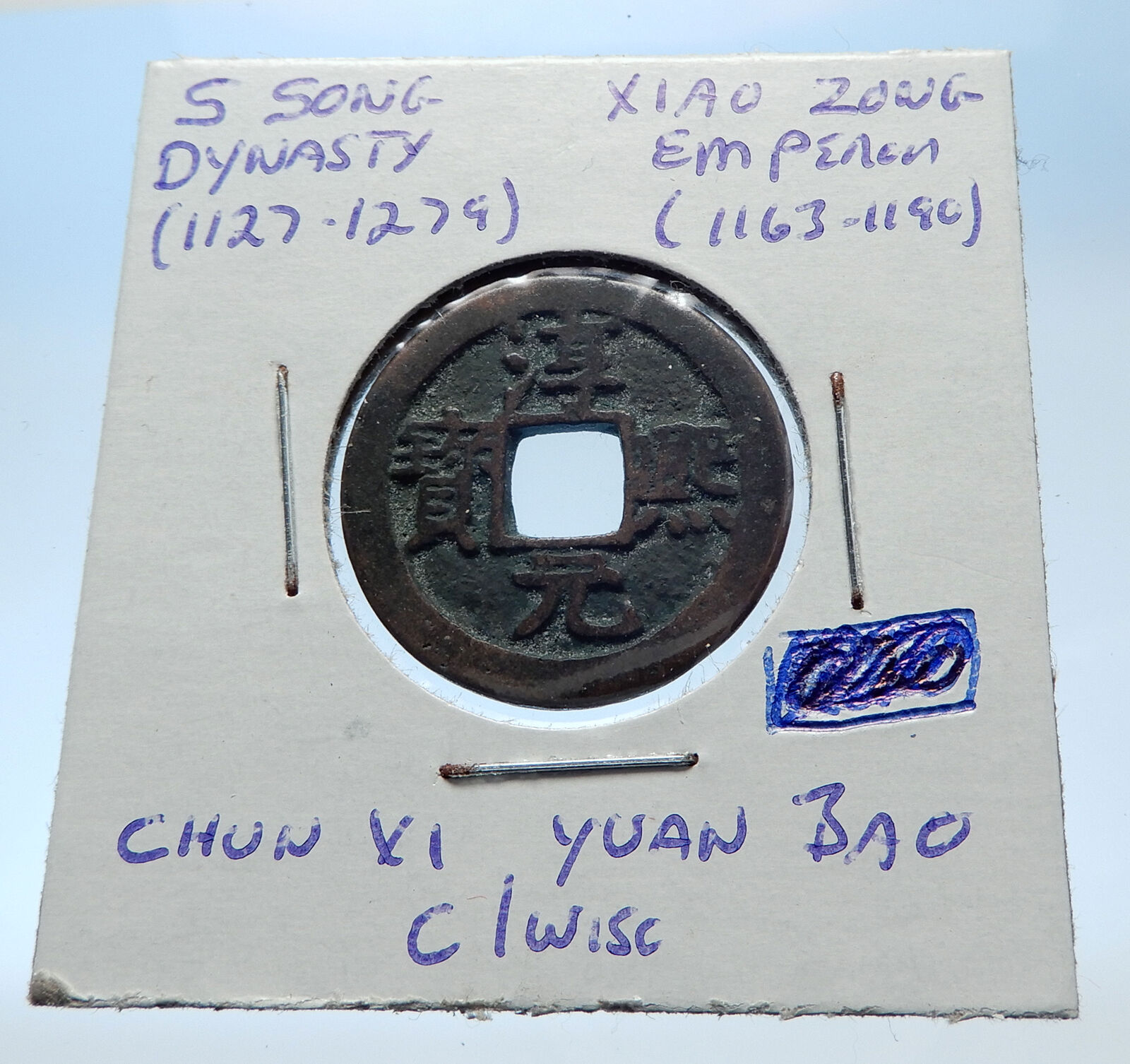|
Chinese
Southern Sung Dynasty
Coin
Qian Dao
, 1165-1173 A.D.
Iron Cash 24mm (5.24 grams)
H-17.109
You are bidding on the exact
item pictured, provided with a Certificate of Authenticity and Lifetime
Guarantee of Authenticity.
The
Song dynasty was an era of Chinese history that began in 960 and
continued until 1279. It succeeded the
Five Dynasties and Ten Kingdoms period
, and was
followed by the
Yuan dynasty
. It was the first government in
world history to nationally issue
banknotes
or true paper money, and the first
Chinese government to establish
a permanent standing navy
. This dynasty also
saw the first known use of
gunpowder
, as well as the first discernment of
true north
using a
compass
.
The Song dynasty is divided into two distinct periods: the Northern Song and
Southern Song. During the Northern Song (Chinese:
北宋, 960–1127), the Song capital was in the
northern city of Bianjing (now
Kaifeng
), and the dynasty controlled most of
inner China
. The Southern Song (Chinese:
南宋, 1127–1279) refers to the period after
the Song lost control of
northern China
to the
Jin dynasty
in the
Jin–Song wars
. During this time, the Song court
retreated south of the
Yangtze River
and established their capital at
Lin’an (now Hangzhou
). Although the Song dynasty had lost
control of the traditional birthplace of Chinese civilization along the
Yellow River
, the Song economy was not in
ruins, as the Southern Song Empire contained 60 percent of China’s population
and a majority of the most productive agricultural land. The Southern Song
dynasty considerably bolstered its
naval strength to defend its waters and land borders and to conduct
maritime
missions abroad.
To repel the Jin, and later the
Mongols
, the Song developed revolutionary new
military technology augmented by the use of gunpowder. In 1234, the Jin dynasty
was conquered by the Mongols, who took control of northern China, maintaining
uneasy relations with the Southern Song.
Möngke Khan
, the fourth
Great Khan
of the Mongol Empire, died in 1259
while besieging the city of
Chongqing
. His younger brother
Kublai Khan
was proclaimed the new Great Khan,
though his claim was only partially recognized by the Mongols in the west. In
1271, Kublai Khan was proclaimed the
Emperor of China
. After two decades of sporadic
warfare, Kublai Khan’s armies
conquered the Song dynasty
in 1279. China was
once again
unified
, under the Mongol
Yuan dynasty
(1271–1368).
The Song dynasty regained China’s unity after the fall of the Tang dynasty.
Creating China into a dominant empire, the Song made the most richest, skilled,
and populous known country on earth. The population of China doubled in size
during the 10th and 11th centuries. This growth came through expanded rice
cultivation in central and southern China, the use of early-ripening rice from
south-east and southern Asia, and the production of abundant food surpluses. The
Northern Song census recorded a population of roughly 50 million, much like the
Han
and
Tang
dynasties. This data is found in the
Standard Histories
. However, it is
estimated that the Northern Song had a population of some 100 million people,
and 200 million by the time of the
Ming dynasty
. This dramatic increase of
population fomented an
economic revolution in pre-modern China
. The
expansion of the population was partially the cause for the gradual withdrawal
of the central government from heavily regulating the market economy. A much
larger populace also increased the importance of the lower gentry’s role in
grassroots administration and local affairs. Appointed officials in county and
provincial centers relied upon the scholarly gentry for their services,
sponsorship, and local supervision.
Social life during the Song was vibrant. Citizens gathered to view and trade
precious artworks, the populace intermingled at public festivals and private
clubs, and cities had lively entertainment quarters. The spread of literature
and knowledge was enhanced by the earlier invention of
woodblock printing
and the 11th-century
invention of
movable-type
printing. Pre-modern technology,
science, philosophy, mathematics, engineering, and other intellectual pursuits
flourished over the course of the Song. Philosophers such as
Cheng Yi
and
Zhu Xi
reinvigorated
Confucianism
with new commentary, infused with
Buddhist
ideals, and emphasized a new
organization of classic texts that brought out the core doctrine of
Neo-Confucianism
. Although the institution of
the
civil service examinations
had existed since
the Sui dynasty
, it became much more prominent in
the Song period. This became a leading factor in the shift of an
aristocratic
elite to a
bureaucratic
elite.
Southern
Song, 1127–1279279
Although weakened and pushed south along the
Huai River
, the Southern Song found new ways to
bolster its strong economy and defend its own state against the Jin dynasty.
They had able military officers such as
Yue Fei
and
Han Shizhong
. The government sponsored massive
shipbuilding
and
harbor
improvement projects, and the
construction of beacons
and seaport
warehouses
in order to support maritime trade
abroad and the major international
seaports
, such as
Quanzhou
,
Guangzhou
, and
Xiamen
, that were sustaining China’s commerce.
To protect and support the multitudes of ships sailing for maritime interests
into the waters of the
East China Sea
and
Yellow Sea
(to
Korea
and
Japan
),
Southeast Asia
, the
Indian Ocean
, and the
Red Sea
, it was a necessity to establish an
official standing navy
. The Song dynasty therefore established
China’s first permanent navy in 1132, with a headquarters at Dinghai. With a
permanent navy, the Song were prepared to face the naval forces of the Jin on
the Yangtze River in 1161, in the
Battle of Tangdao
and the
Battle of Caishi
. During these battles the Song
navy employed swift
paddle wheel driven
naval vessels armed with
trebuchet catapults
aboard the decks that
launched gunpowder bombs
. Although the Jin forces commanded by
Emperor Hailing
boasted 70,000 men on 600
warships, and the Song forces only 3,000 men on 120 warships, the Song dynasty
forces were victorious in both battles due to the destructive power of the bombs
and the rapid assaults by paddle wheel ships. The strength of the navy was
heavily emphasized after that. A century after the navy was founded it had grown
in size to 52,000 fighting marines. The Song government confiscated portions of
land owned by the landed gentry in order to raise revenue for these projects, an
act which caused dissension and loss of loyalty amongst leading members of Song
society but did not stop the Song’s defensive preparations. Financial matters
were made worse by the fact that many wealthy, land-owning families—some which
had officials working for the government—used their social connections with
those in office in order to obtain tax-exempt status.
Although the Song dynasty was able to hold back the Jin, a new considerable
foe came to power over the steppe, deserts, and plains north of the Jin dynasty.
The Mongols
, led by
Genghis Khan
(r. 1206–1227), initially invaded
the Jin dynasty in 1205 and 1209, engaging in large raids across its borders,
and in 1211 an enormous Mongol army was assembled to invade the Jin. The Jin
dynasty was forced to submit and pay tribute to the Mongols as
vassals
; when the Jin suddenly moved their
capital city from Beijing
to Kaifeng, the Mongols saw this as a
revolt. Under the leadership of
Ögedei Khan
(r.1229–1241), both the Jin dynasty
and Western Xia dynasty were conquered by Mongol forces. The Mongols also
invaded
Korea
, the
Abbasid Caliphate
of the Middle East, and
Kievan Rus’
. The Mongols were at one time
allied with the Song, but this alliance was broken when the Song recaptured the
former imperial capitals of Kaifeng,
Luoyang
, and
Chang’an
at the collapse of the Jin dynasty.
The Mongol leader
Möngke Khan
led a campaign against the Song in
1259 but died on August 11 during the
Battle of Fishing Town
in
Chongqing
. Möngke’s death and the ensuing
succession crisis prompted
Hulagu Khan
to pull the bulk of the Mongol
forces out of the Middle East where they were poised to fight the
Egyptian Mamluks
(who defeated the remaining
Mongols at
Ain Jalut
). Although Hulagu was allied with
Kublai Khan
, his forces were unable to help in
the assault against the Song, due to Hulagu’s war with the
Golden Horde
.
Kublai continued the assault against the Song, gaining a temporary foothold
on the southern banks of the Yangtze. Kublai made preparations to take
Ezhou
, but a pending civil war with his brother
Ariq Böke
—a rival claimant to the Mongol
Khaganate—forced Kublai to move with the bulk of his forces back north. In
Kublai’s absence, the Song forces were ordered by Chancellor Jia Sidao to make
an opportune assault, and succeeded in pushing the Mongol forces back to the
northern banks of the Yangzi. There were minor border skirmishes until 1265,
when Kublai won a significant battle in Sichuan. From 1268 to 1273, Kublai
blockaded the Yangzi River with his navy and
besieged Xiangyang
, the last obstacle in his
way to invading the rich Yangzi River basin. Kublai officially declared the
creation of the
Yuan dynasty
in 1271. In 1275, a Song force of
130,000 troops under Chancellor
Jia Sidao
was defeated by Kublai’s newly
appointed commander-in-chief, general
Bayan
. By 1276, most of the Song territory had
been captured by Yuan forces. In the
Battle of Yamen
on the
Pearl River Delta
in 1279, the Yuan army, led
by the general
Zhang Hongfan
, finally crushed the Song
resistance. The last remaining ruler, the 8-year-old emperor
Emperor Huaizong of Song
committed suicide,
along with Prime Minister
Lu Xiufu
and 800 members of the royal
clan. On Kublai’s orders, carried out by his commander Bayan, the rest of the
former imperial family of Song were unharmed; the deposed
Emperor Gong
was demoted, being given the title
‘Duke of Ying’, but was eventually exiled to
Tibet
where he took up a monastic life. The
former emperor would eventually be forced to commit suicide under the orders of
Kublai’s great-great grandson,
Gegeen Khan
, out of fear that Emperor Gong
would stage a coup to restore his reign.
|









